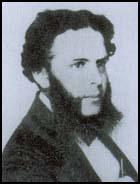Horace Moule

Horatio Mosley Moule, the fourth son of Henry Moule, a vicar, was born on 30th May 1832 at Fordington.
In 1851 Moule entered Trinity College, Oxford, but left without a degree. In 1854 he entered Queens' College, Cambridge, where he won the Hulsean Prize. Moule became assistant master at Marlborough College. He also wrote articles for various literary journals.
Moule became friends with Thomas Hardy in 1856. Moule was eight years older than Hardy. Moule has been described as "a charming and gentle man as well as a brilliant teacher". Moule also introduced him to socialism and to the radical ideas being expressed in the Saturday Review. Edited by John Douglas Cook, it attributed the majority of social evils to social inequality.
Under Moule's influence, Hardy wrote his first novel, The Poor Man and the Lady. The story tells of the love and marriage of a young architect and the daughter of a large local landowner. Moule arranged for it to be read by publisher, Alexander Macmillan. He replied that although he liked some aspects of the novel he disliked was he considered to be an excessive attack on the upper classes. Hardy also sent the manuscript to George Meredith. He replied that the book would be perceived as "socialistic" or even "revolutionary" and that as a result would not be well-received by the critics. Meredith went onto argue that this might prove to be handicap to Hardy's future career. He suggested that Hardy should either rewrite the story or write another novel with a different plot.
Moule became a government inspector of workhouses. He continued to train as a lawyer and in 1862 he was admitted to the Middle Temple. Despite his intellectual gifts, Moule became increasingly depressed about his unfulfilled like. He also became a taker of opium and heavy drinker and some of his friends described him as an alcoholic.
On 21st December, 1873, Horace Moule was staying with his brother, Charles Moule. When he heard a strange noise in an adjoining room, Charles discovered that Horace had slashed his windpipe with a razor. He was covered in blood but conscious and was able to utter his last words "Easy to die. Love to my mother."
Andrew Norman, the author of Thomas Hardy: Behind the Mask (2011) has argued: "He (Moule) had befriended Hardy; encouraged him with gifts of books and intellectually stimulating conversations; set him on the road to socialism, and shielded and defended him when his books were denigrated by other critics. But for years Moule, a taker of opium and a heavy drinker, had battled against severe depression and suicidal tendencies, and at the end of the day, Hardy's great friend and comrade had been unable to overcome his problems. what was it that had brought the two of them so closely together? Perhaps in Hardy, Moule recognised a kindred spirit: a person, like himself, of great sensitivity, who saw enormous suffering in the world and found it hard to bear."
Primary Sources
(1) Andrew Norman, Thomas Hardy: Behind the Mask (2011)
He (Horace Moule) had befriended Hardy; encouraged him with gifts of books and intellectually stimulating conversations; set him on the road to socialism, and shielded and defended him when his books were denigrated by other critics. But for years Moule, a taker of opium and a heavy drinker, had battled against severe depression and suicidal tendencies, and at the end of the day, Hardy's great friend and comrade had been unable to overcome his problems. what was it that had brought the two of them so closely together? Perhaps in Hardy, Moule recognised a kindred spirit: a person, like himself, of great sensitivity, who saw enormous suffering in the world and found it hard to bear.
